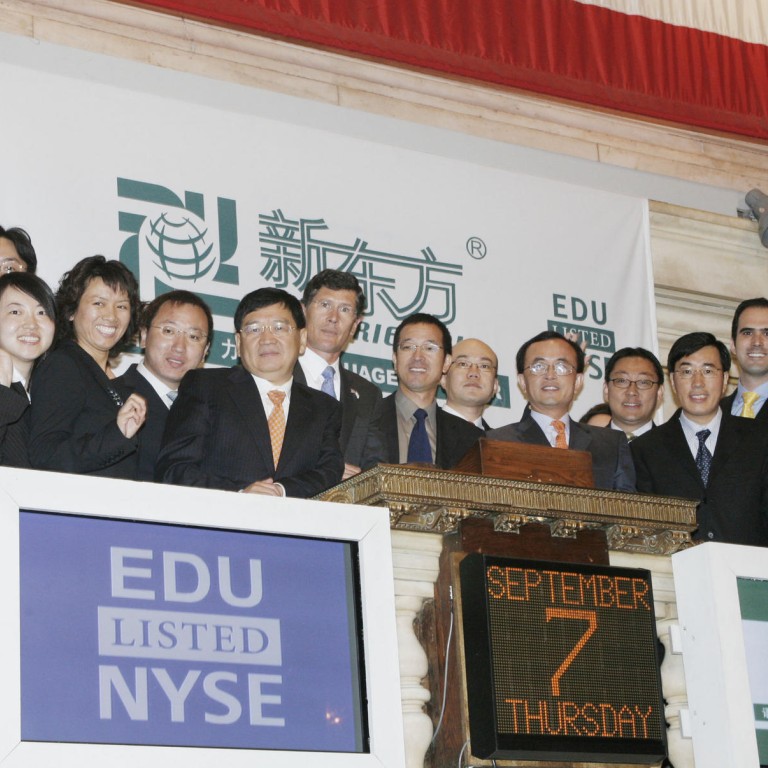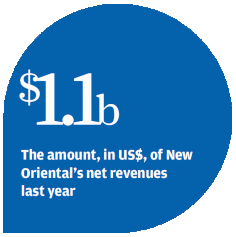
Success beyond the classroom for language school founder
In a classic rags to riches tale, the founder of New Oriental, Michael Yu has ventured into online learning with a dream to open a university
When discussing his journey from a leaky classroom in Beijing's northern suburbs to the owner of the mainland's largest private education company, Michael Yu Minhong likes to evoke a fellow wanderer: the camel.
"A career is like a desert. I am constantly searching for an oasis. [To find it,] you need perseverance, a sense of orientation and you can't be too hasty," he once told magazine.

That first classroom seems a long way away. New Oriental now has more than 700 schools and English language centres in 50 mainland cities teaching over 2.5 million high-school and university students. Net revenues hit US$1.1 billion last year, with year-on-year growth averaging 31.9 per cent over the past four years.
The son of a carpenter, Yu grew up in the countryside. Though education was his escape from poverty, he lost his first job as a teacher at Peking University in 1993 after school administrators discovered he was teaching on the side, a business Yu started in the hope of making enough money to study in the United States.
His teaching methods had proved so popular he had more than 100 students turn up for off-campus classes. "I was punished and lost face," Yu said.
Abandoning his dream of going to the US, Yu started posting adverts with some friends on Beijing's lampposts for their education business.
As multinationals started pouring into the mainland in the early '90s, the demand for university graduates with good English language skills ensured there was no shortage of students willing to spend money for after-school crammers and Yu's firm took off. Yu puts some of the success down to first-mover advantage, a strong brand identity, clean classrooms and well-paid staff.
Even today, only 1 to 2 per cent of mainlanders attended private English language schools in the country, said TH Capital founder and New Oriental analyst Hou Tian. She has a "buy" rating on the company, citing massive untapped demand for English training and the company's expansion into online learning.
Hou credits much of New Oriental's success to Yu's down-to-earth approach. "You don't feel like he is a billionaire. He can be a teacher or a big brother. You don't see that management style very often in China," Hou said.
New Oriental's two other original co-founders had since left the company, she said, but Yu was a symbol for the company as "people come to New Oriental because of Michael himself".
He appeared to have few hobbies outside work, said Hou.
His story has elevated him to almost cult-like status. Last summer, a Chinese-language film loosely based on Yu and called proved a surprise box-office hit, grossing more than US$86 million, according to figures from film industry research group EntGroup. The film was partly written by New Oriental co-founder Xu Xiaoping and follows three friends who overcame personality clashes and a copyright infringement lawsuit to build a successful business in China.
While the film allowed for creative embellishments, the lawsuit really happened. In an earlier media interview, Yu said he was initially oblivious to copyright rules when he started the business and happily photocopied textbooks and mock US university entrance examination papers to give to his students.
Such practices quickly landed the firm in the dock and, in 2003, New Oriental shelled out US$774,000 after being found guilty of breach of copyright.
"We learned a lot from the lawsuit and quickly co-operated with international standards" for intellectual property, Yu told , though he admitted the company would never have got off the ground had it paid full price for textbooks.
The court case was pocket change compared with the hit the company's stock price took in 2012 after a report by short-seller firm Muddy Waters accused New Oriental management of fraud. Before the Muddy Waters report, New Oriental had already fielded questions from the US Securities and Exchange Commission over its accounting practices.
Within a fortnight of the report's release, the stock halved in price. The SEC just last month announced it had finished an investigation into Muddy Waters' claims and would not take enforcement action.
Hou felt the report was overdone. "You need to separate between fraud and a mistake," she said, "especially with emerging-market companies."
The firm now teaches half a dozen languages and in June teamed up with Tencent Holdings to develop online courses. Yu has said one of his next dreams is to open a university.

